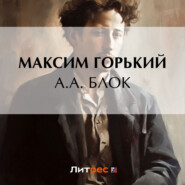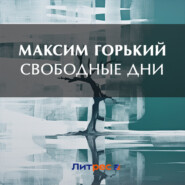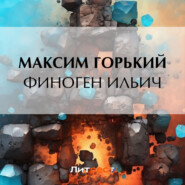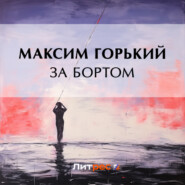По всем вопросам обращайтесь на: info@litportal.ru
(©) 2003-2025.
✖
Mother
Настройки чтения
Размер шрифта
Высота строк
Поля
"Do you know, Andrey, the people whose hearts are always aching are the ones who joke most?"
The Little Russian was silent a while, and then answered, blinking his eyes:
"No, that's not true. If it were, then the whole of Russia would split its sides with laughter."
Natasha made her appearance again. She, too, had been in prison, in another city, but she had not changed. The mother noticed that in her presence the Little Russian grew more cheerful, was full of jokes, poked fun at everybody, and kept her laughing merrily. But after she had left he would whistle his endless songs sadly, and pace up and down the room for a long time, wearily dragging his feet along the floor.
Sashenka came running in frequently, always gloomy, always in haste, and for some reason more and more angular and stiff. Once when Pavel accompanied her out onto the porch, the mother overheard their abrupt conversation.
"Will you carry the banner?" the girl asked in a low voice.
"Yes."
"Is it settled?"
"Yes, it's my right."
"To prison again?" Pavel was silent. "Is it not possible for you – " She stopped.
"What?"
"To give it up to somebody else?"
"No!" he said aloud.
"Think of it! You're a man of such influence; you are so much liked – you and Nakhodka are the two foremost revolutionary workers here. Think how much you could accomplish for the cause of freedom! You know that for this they'll send you off far, far, and for a long time!"
Nilovna thought she heard in the girl's voice the familiar sound of fear and anguish, and her words fell upon the mother's heart like heavy, icy drops of water.
"No, I have made up my mind. Nothing can make me give it up!"
"Not even if I beg you – if I – "
Pavel suddenly began to speak rapidly with a peculiar sternness.
"You ought not to speak that way. Why you? You ought not!"
"I am a human being!" she said in an undertone.
"A good human being, too!" he said also in an undertone, and in a peculiar voice, as if unable to catch his breath. "You are a dear human being to me, yes! And that's why – why you mustn't talk that way!"
"Good-by!" said the girl.
The mother heard the sound of her departing footsteps, and knew that she was walking away very fast, nay, almost running. Pavel followed her into the yard.
A heavy oppressive fear fell like a load on the mother's breast. She did not understand what they had been talking about, but she felt that a new misfortune was in store for her, a great and sad misfortune. And her thoughts halted at the question, "What does he want to do?" Her thoughts halted, and were driven into her brain like a nail. She stood in the kitchen by the oven, and looked through the window into the profound, starry heaven.
Pavel walked in from the yard with Andrey, and the Little Russian said, shaking his head:
"Oh, Isay, Isay! What's to be done with him?"
"We must advise him to give up his project," said Pavel glumly.
"Then he'll hand over those who speak to him to the authorities," said the Little Russian, flinging his hat away in a corner.
"Pasha, what do you want to do?" asked the mother, drooping her head.
"When? Now?"
"The first of May – the first of May."
"Aha!" exclaimed Pavel, lowering his voice. "You heard! I am going to carry our banner. I will march with it at the head of the procession. I suppose they'll put me in prison for it again."
The mother's eyes began to burn. An unpleasant, dry feeling came into her mouth. Pavel took her hand and stroked it.
"I must do it! Please understand me! It is my happiness!"
"I'm not saying anything," she answered, slowly raising her head; but when her eyes met the resolute gleam in his, she again lowered it. He released her hand, and with a sigh said reproachfully:
"You oughtn't to be grieved. You ought to feel rejoiced. When are we going to have mothers who will rejoice in sending their children even to death?"
"Hopp! Hopp!" mumbled the Little Russian. "How you gallop away!"
"Why; do I say anything to you?" the mother repeated. "I don't interfere with you. And if I'm sorry for you – well, that's a mother's way."
Pavel drew away from her, and she heard his sharp, harsh words:
"There is a love that interferes with a man's very life."
She began to tremble, and fearing that he might deal another blow at her heart by saying something stern, she rejoined quickly:
"Don't, Pasha! Why should you? I understand. You can't act otherwise, you must do it for your comrades."
"No!" he replied. "I am doing it for myself. For their sake I can go without carrying the banner, but I'm going to do it!"
Andrey stationed himself in the doorway. It was too low for him, and he had to bend his knees oddly. He stood there as in a frame, one shoulder leaning against the jamb, his head and other shoulder thrust forward.
"I wish you would stop palavering, my dear sir," he said with a frown, fixing his protuberant eyes on Pavel's face. He looked like a lizard in the crevice of a stone wall.
The mother was overcome with a desire to weep, but she did not want her son to see her tears, and suddenly mumbled: "Oh, dear! – I forgot – " and walked out to the porch. There, her head in a corner, she wept noiselessly; and her copious tears weakened her, as though blood oozed from her heart along with them.
Through the door standing ajar the hollow sound of disputing voices reached her ear.
"Well, do you admire yourself for having tortured her?"
"You have no right to speak like that!" shouted Pavel.
"A fine comrade I'd be to you if I kept quiet when I see you making a fool of yourself. Why did you say all that to your mother?"
The Little Russian was silent a while, and then answered, blinking his eyes:
"No, that's not true. If it were, then the whole of Russia would split its sides with laughter."
Natasha made her appearance again. She, too, had been in prison, in another city, but she had not changed. The mother noticed that in her presence the Little Russian grew more cheerful, was full of jokes, poked fun at everybody, and kept her laughing merrily. But after she had left he would whistle his endless songs sadly, and pace up and down the room for a long time, wearily dragging his feet along the floor.
Sashenka came running in frequently, always gloomy, always in haste, and for some reason more and more angular and stiff. Once when Pavel accompanied her out onto the porch, the mother overheard their abrupt conversation.
"Will you carry the banner?" the girl asked in a low voice.
"Yes."
"Is it settled?"
"Yes, it's my right."
"To prison again?" Pavel was silent. "Is it not possible for you – " She stopped.
"What?"
"To give it up to somebody else?"
"No!" he said aloud.
"Think of it! You're a man of such influence; you are so much liked – you and Nakhodka are the two foremost revolutionary workers here. Think how much you could accomplish for the cause of freedom! You know that for this they'll send you off far, far, and for a long time!"
Nilovna thought she heard in the girl's voice the familiar sound of fear and anguish, and her words fell upon the mother's heart like heavy, icy drops of water.
"No, I have made up my mind. Nothing can make me give it up!"
"Not even if I beg you – if I – "
Pavel suddenly began to speak rapidly with a peculiar sternness.
"You ought not to speak that way. Why you? You ought not!"
"I am a human being!" she said in an undertone.
"A good human being, too!" he said also in an undertone, and in a peculiar voice, as if unable to catch his breath. "You are a dear human being to me, yes! And that's why – why you mustn't talk that way!"
"Good-by!" said the girl.
The mother heard the sound of her departing footsteps, and knew that she was walking away very fast, nay, almost running. Pavel followed her into the yard.
A heavy oppressive fear fell like a load on the mother's breast. She did not understand what they had been talking about, but she felt that a new misfortune was in store for her, a great and sad misfortune. And her thoughts halted at the question, "What does he want to do?" Her thoughts halted, and were driven into her brain like a nail. She stood in the kitchen by the oven, and looked through the window into the profound, starry heaven.
Pavel walked in from the yard with Andrey, and the Little Russian said, shaking his head:
"Oh, Isay, Isay! What's to be done with him?"
"We must advise him to give up his project," said Pavel glumly.
"Then he'll hand over those who speak to him to the authorities," said the Little Russian, flinging his hat away in a corner.
"Pasha, what do you want to do?" asked the mother, drooping her head.
"When? Now?"
"The first of May – the first of May."
"Aha!" exclaimed Pavel, lowering his voice. "You heard! I am going to carry our banner. I will march with it at the head of the procession. I suppose they'll put me in prison for it again."
The mother's eyes began to burn. An unpleasant, dry feeling came into her mouth. Pavel took her hand and stroked it.
"I must do it! Please understand me! It is my happiness!"
"I'm not saying anything," she answered, slowly raising her head; but when her eyes met the resolute gleam in his, she again lowered it. He released her hand, and with a sigh said reproachfully:
"You oughtn't to be grieved. You ought to feel rejoiced. When are we going to have mothers who will rejoice in sending their children even to death?"
"Hopp! Hopp!" mumbled the Little Russian. "How you gallop away!"
"Why; do I say anything to you?" the mother repeated. "I don't interfere with you. And if I'm sorry for you – well, that's a mother's way."
Pavel drew away from her, and she heard his sharp, harsh words:
"There is a love that interferes with a man's very life."
She began to tremble, and fearing that he might deal another blow at her heart by saying something stern, she rejoined quickly:
"Don't, Pasha! Why should you? I understand. You can't act otherwise, you must do it for your comrades."
"No!" he replied. "I am doing it for myself. For their sake I can go without carrying the banner, but I'm going to do it!"
Andrey stationed himself in the doorway. It was too low for him, and he had to bend his knees oddly. He stood there as in a frame, one shoulder leaning against the jamb, his head and other shoulder thrust forward.
"I wish you would stop palavering, my dear sir," he said with a frown, fixing his protuberant eyes on Pavel's face. He looked like a lizard in the crevice of a stone wall.
The mother was overcome with a desire to weep, but she did not want her son to see her tears, and suddenly mumbled: "Oh, dear! – I forgot – " and walked out to the porch. There, her head in a corner, she wept noiselessly; and her copious tears weakened her, as though blood oozed from her heart along with them.
Through the door standing ajar the hollow sound of disputing voices reached her ear.
"Well, do you admire yourself for having tortured her?"
"You have no right to speak like that!" shouted Pavel.
"A fine comrade I'd be to you if I kept quiet when I see you making a fool of yourself. Why did you say all that to your mother?"

















